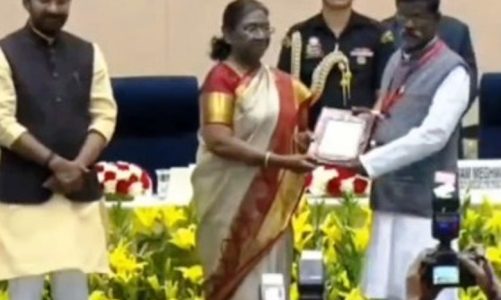Thousands of residents witnessed devotees praying to Shiva-Parvati with iron hooks pierced into their backs and tongues. To please the diety, they also hung themselves with bamboo and swings. The event is held every year and called Bhokta festival celebrated in most of the villages here.
Traditionally, the festival has been celebrated in rural areas for more than 100 years. A huge crowd from the urban areas and neighboring West Bengal attends the Bhokta Festival at Shiva Temples in Chandankyari, Kasmar, Chas, and Nawadih Blocks.
In order to appease the god, people kept fast on this day, according to a devotee. Then devotees pierced their muscles with hooks, nails, and other sharp objects. Though visitors found it horrifying, locals believe that Shiva gives special blessings through this ritual.
Later holy procession reaches the temple after wandering through the streets of the villages. The devotees in different postures demonstrate with iron hooks, nail pins, arrows pierced on their body and tongue. There are many visitors who come specifically to see devotees hung on bamboo sticks.
Seeing devotees rotating on bamboo sticks with rope tides and iron hooks piercing their backs at 50 feet above the ground really amazed people.

The people of Pundru village in Chas Block celebrate Bhokta festival since 169 years ago. As the priest of the village described, thousands of years ago, Shiva began doing ‘Tandav’ in pain after separating from Parvati. The Bhoktas (devotees) used to puncture iron hooks on their bodies and pray to Lord Shiva to feel the pain.
Another devotee said legend has it that the lord Shiva, carrying the lifeless body of his consort Parvati, pain searing in his heart walked through the area before performing his dance of destruction. The rituals are to placate Shiva.
The word Bhokta means followers of God, and the festival is also known as Charak Puja, which is the festival of sorrows. The people have adopted this culture from their elders and forefathers and it will continue the same way till the humanity lives on, said Radhanath Mahtha a resident of Barkama village.





